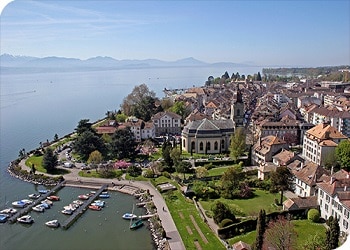A journalistic investigation has revealed that Enrique Rais, a fugitive from corruption charges in El Salvador who is also reportedly the subject of a US investigation, has been living in a luxurious hideout in Switzerland, showcasing how Salvadoran elites are able to use their influence to evade justice.
Salvadoran businessman Enrique Rais is renting an apartment in the Swiss town of Morges on the banks of Lake Geneva, according to an October 11 report by the Salvadoran news outlet Factum, which worked in collaboration with Swiss newspaper Tages-Anzeiger. He also reportedly has several other properties in the European country.
Rais, who has both Salvadoran and Swiss nationality, officially registered as a resident of Morges in April 2017, just three months after was reported to have fled El Salvador in a private jet following the issuance of an order for his arrest. A judge had confiscated his Salvadoran passport, but not his Swiss one.
In the interest of full disclosure, we note that one of the subjects of this article, Enrique Rais, has sued InSight Crime Senior Investigator Héctor Silva Ávalos in El Salvador for defamation in connection with an article he wrote based on official investigations. A Salvadoran court absolved Silva in August 2017. Rais has appealed that decision and a higher court ordered the hearing to be reheld.
Rais is accused of corruption and fraud in the Central American nation, and is also the subject of a US Drug Enforcement Administration (DEA) investigation, according to Factum.
The plane he allegedly used to flee El Salvador had been impounded by US authorities in 2016 along with three other aircraft on suspicion they were fraudulently using US licenses. A US judge released Rais’ three planes and helicopter in June 2016. The helicopter is now in Switzerland, registered to one of Rais’ three addresses, Factum reported.
The investigation by Factum sparked a debate about why Interpol had not issued a “red notice,” or international arrest request, for Rais.
When Salvadoran Attorney General Douglas Meléndez publicly questioned why the national police had not requested a red notice, Police Director Howard Cotto answered that a total of five such requests had been sent to Interpol’s headquarters in Lyon, France since the January approval of the arrest warrant by the Salvadoran judge.
In February, Interpol told Factum that the absence of red notice could indicate either the absence of a request, one that was incomplete, or a decision by the requesting state to keep the red notice secret.
Swiss authorities told Tages-Anzeiger that there was a possibility that they could open an investigation against Rais, but no formal proceedings have yet been announced. Switzerland does not, however, extradite its nationals. This means that Rais, who told the print publication of 24heures that he is the victim of a political and economic conspiracy, will likely remain safe from Salvadoran justice as long as he remains in the European country.
InSight Crime Analysis
The case of Enrique Rais highlights how El Salvador’s justice system tends to generate different outcomes for the rich and powerful than it does for the less well-off.
Rais has been accused of having bought off El Salvador’s previous Attorney General Luis Martínez, who is currently behind bars, and he is said to have flown former Honduran President Porfirio Lobo in his private jets. Yet Rais was able to flee from Salvadoran justice thanks in large part to his substantial financial resources in combination with his status as a Swiss national.
SEE ALSO: El Salvador News and Profiles
At the same time, it also seems that El Salvador’s authorities have not tried very hard to locate and repatriate the fugitive tycoon. Factum reports that the Central American nation did not even ask Switzerland for information concerning Rais following his flight, despite the probability that he would use the European country as a refuge given his double nationality.
Meanwhile, like neighboring Guatemala and Honduras, Salvadoran authorities continue to expend significant effort and resources cracking down on suspected gang members, many of whom are young and poor with few legitimate education or employment opportunities. The Rais case suggests that the emphasis on anti-gang operations may be hindering progress on combating corruption in El Salvador.

